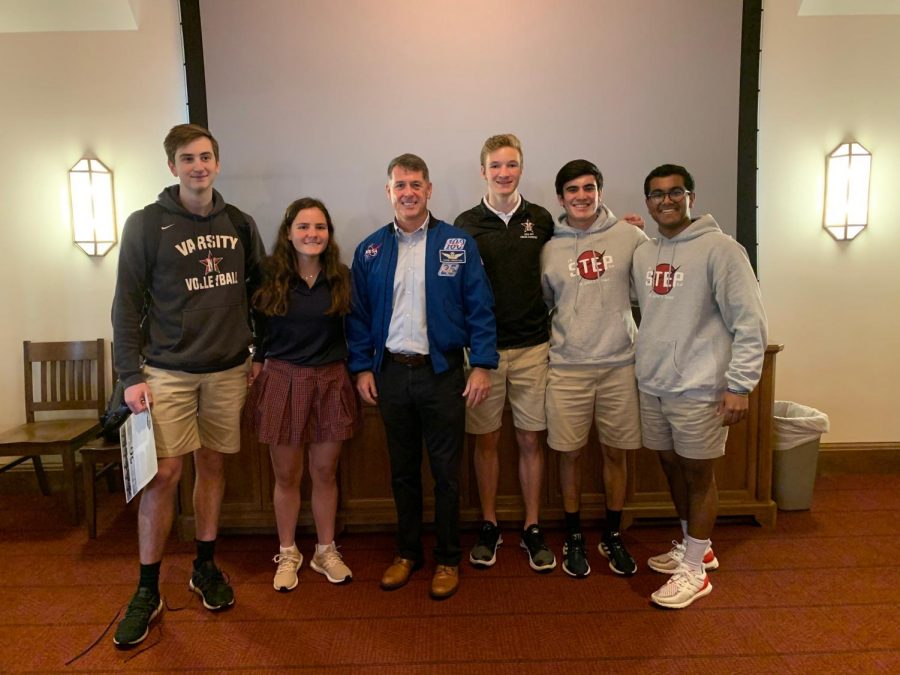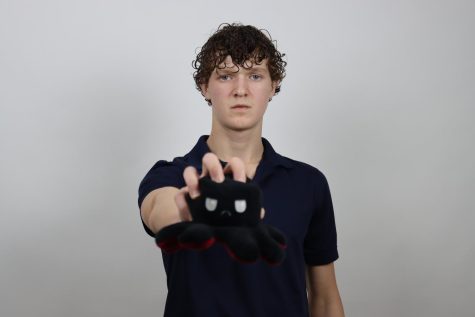Astronaut visits STEP Club, speaks about experience on ISS
On Feb. 18, NASA astronaut Robert S. Kimbrough spoke about his experience on the International Space Station as a Space, Technology, Economics and Policy club speaker.
March 9, 2020
After his second trip to space, unaccustomed to the effects of gravity on Earth, NASA astronaut Robert S. Kimbrough found himself accidentally dropping glassware around his kitchen.
“My wife was way ahead of the game my second time,” Kimbrough said. “She had plastic cups and plates for me when I got home.”
On Feb. 18, Kimbrough spoke about his experience on the International Space Station as a Space, Technology, Economics and Policy club speaker.
“When I was growing up, everyone my age wanted to be an astronaut,” said Kimbrough, who was introduced to the concept of space exploration from an early point in his life.
After Kimbrough finished school at the West Point Military Academy, he became a pilot and was later one of 14 people selected for the 2004 astronaut class; the most recent selection had 18,000 applicants, from which they picked 12.
“I applied four times, so persistence is a pretty good thing,” Kimbrough said. “If someone slams the door on your dream, keep working hard and don’t let that stop you.”
In 2008, Kimbrough first went on the STS-126 space shuttle mission, and in 2017, he served as a commander for six months on the International Space Station.
Life in space was a big adjustment for Kimbrough. He had to adapt to using tools for experiments and repairs, eating and doing other everyday activities without any gravity.
“When you’re in space, you float, everything floats, you don’t have a choice,” Kimbrough said. “It’s really fun to figure that out.”
Exercise was also extremely important due to the absence of gravity. In space, you lose muscle mass and your cardiovascular system weakens because less effort is needed to move around and to push blood around the body. To help the astronauts keep in shape, the ISS is equipped with many different machines for squats and bench presses, treadmills and a stationary bike adapted for space.
“You have to do two hours everyday [including] one hour of cardio,” Kimbrough said. “The bike is super hard to do at first—it’s kind of like riding a unicycle on a trampoline.”
Unmanned modules controlled from Earth are sent up to the space station almost every month, bringing food, clothes, experiments and care packages from families. The modules are also used to dispose of waste since most of them burn up as they reenter the atmosphere. A critical part of the astronauts’ training is learning how to operate the robotic arm used to capture the modules as they fly towards the ISS. The modules are flying through space at about 500 mph, the task requires precision.
“I didn’t realize how much training went into a seemingly simple task like docking a supply module,” junior Nicholas Fenouil said.
American astronauts share the ISS with Russian cosmonauts, along with astronauts from other countries like Japan. Kimbrough describes his experiences as an opportunity to share culture and ideas.
“We get to share our traditions with the other folks on board,” Kimbrough said. “Russian Christmas is in January, so we got to have two Christmases.”
Kimbrough and the other astronauts performed many experiments during their time on the ISS, such as stem cell research, sequencing DNA and building satellites. Most of the satellites they build are sent to orbit around Earth, but there are small pre-programmed satellites called “spheres” that float around in the ISS.
“The cool part about those is we aren’t flying them,” Kimbrough said. “They’re actually students on the ground from MIT having robotic competitions flying around the space station.”
Each astronaut on the ISS has their own closet-sized bedroom and a phone system for reaching Earth.
“Amazing reception. It is literally better than me standing here talking to you,” Kimbrough said.
Kimbrough would call his wife daily and then have a video chat with his family every week. He would occasionally help his two twin daughters with homework through the phone system.
“We live really well up there, from media, movies, TV shows, and all that stuff,” Kimbrough said. “I was in the military, and when you’re on deployment you don’t have a phone or any of those kinds of things.”
The one thing Kimbrough would have loved to bring with him to the space station would be his family.
“I don’t think I would ever come home if my family could come up there with me,” Kimbrough said.
STEP club leader Pierce Ederle took interest in Kimbrough’s detailed recounting of his life in space, and found his speech relevant to young teens in school, especially in such a pivotal era for space exploration.
“In the next few years there will be a lot of developments with SpaceX and NASA going back to the moon and eventually looking at Mars,” Ederle said. “It’s an exciting time for students in school right now, growing up in this new space age.”






